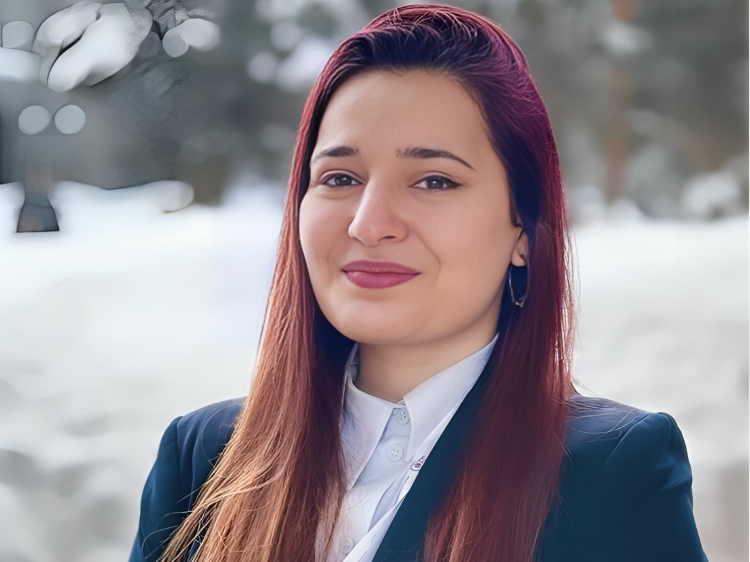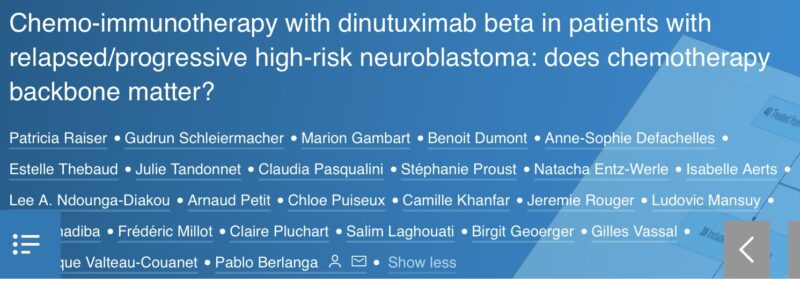
Ruzanna Papyan: The significant role of anti-GD2 therapy in the treatment of relapsed or refractory neuroblastoma
Ruzanna Papyan shared a post on LinkedIn about a recent paper by Patricia Raiser et al., commenting:
“Week 5 of the Global access to Anti-GD2 Campaign
This week, I recommend exploring the significant role of anti-GD2 therapy in the treatment of relapsed or refractory neuroblastoma, highlighting the findings from a pivotal study.
In a 2024 publication in the European Journal of Cancer, a combination therapy involving dinutuximab beta (an anti-GD2 therapy) with either temozolomide-topotecan (TOTEM), temozolomide-irinotecan (TEMIRI), or topotecan-cyclophosphamide (TopoCyclo) demonstrated significant antitumor activity in children with relapsed or refractory high-risk neuroblastoma. The study, conducted by the French Society of Pediatric Oncology (SFCE), found an objective response rate of 42% for dinutuximab beta and TopoCyclo and 40% for dinutuximab beta and TOTEM/TEMIRI.
This emphasizes the potential of chemo-immunotherapy in achieving notable tumor responses in high-risk neuroblastoma regardless of the chemotherapy backbone used.
For those interested in a deeper understanding of this treatment regimen and its impact, you can access the full paper.By advocating for the inclusion of anti-GD2 therapies in the World Health Organization Essential Medicines List, we can help ensure these life-saving treatments are available to children globally.
Your support, knowledge sharing, and advocacy are crucial in making this possible.
Let’s work together to provide every child with the best possible chance for a healthier future.”
Chemo-immunotherapy with dinutuximab beta in patients with relapsed/progressive high-risk neuroblastoma: does chemotherapy backbone matter published in European Journal of Cancer.
Aurhors: Patricia Raiser, Gudrun Schleiermacher, Marion Gambart, Benoit Dumont, Anne-Sophie Defachelles, Estelle Thebaud, Julie Tandonnet, Claudia Pasqualini, Stéphanie Proust, Natacha Entz-Werle, Isabelle Aerts, Lee A. Ndounga-Diakou, Arnaud Petit, Chloe Puiseux, Camille Khanfar, Jeremie Rouger, Ludovic Mansuy, Joy Benadiba, Frédéric Millot, Claire Pluchart, Salim Laghouati, Birgit Geoerger, Gilles Vassal, Dominique Valteau-Couanet, Pablo Berlanga.

Additional information
Source: Ruzanna Papyan/LinkedIn
Ruzanna Papyan is a pediatric oncologist and clinical research physician at the Pediatric Cancer and Blood Disorders Center of Armenia, Hematology Center after Prof. Yeolyan. She is also Head of the Musculoskeletal Multidisciplinary Working Group and Assistant Professor at the Department of Pediatric Oncology and Hematology at Yerevan State Medical University.
Dr. Papyan coordinates educational sessions for the Global Neuroblastoma Network and holds the esteemed position of co-chair of the Adolescents and Young Adults Steering Group at the International Society of Paediatric Oncology (SIOP). She is a member of oncology societies, such as AAHO, SOHO, ESMO, ESO, and POEM. Her research interests include soft tissue and bone sarcomas, and neuroblastomas among children and young adults.
-
Challenging the Status Quo in Colorectal Cancer 2024
December 6-8, 2024
-
ESMO 2024 Congress
September 13-17, 2024
-
ASCO Annual Meeting
May 30 - June 4, 2024
-
Yvonne Award 2024
May 31, 2024
-
OncoThon 2024, Online
Feb. 15, 2024
-
Global Summit on War & Cancer 2023, Online
Dec. 14-16, 2023
